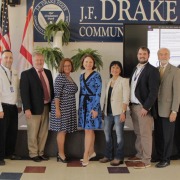Financial Advisor Urges Calm, Cash-Flow Focus as Federal Shutdown Hits Huntsville Hard
The federal government shutdown that began October 1 is now entering its second week, and its effects are reverberating throughout North Alabama’s economy. With so many federal workers and contractors in the region, Huntsville has found itself on the front lines of the financial fallout.
An estimated 45,000 people work at Redstone Arsenal, and the ripple effects extend well beyond its gates. NASA’s Marshall Space Flight Center, a major local employer, has been hit especially hard. Agencywide, NASA furloughed more than 15,000 of its 18,000 employees as part of its shutdown plan, including a significant portion of the Marshall workforce. The specific number of furloughed workers in Huntsville remains unclear because NASA spokespeople both locally and in Washington have also been furloughed, with automatic replies now stating, “NASA is currently closed due to a lapse in government funding.”
According to data reported by the Huntsville Business Journal, a short shutdown lasting roughly two weeks could result in 8,900 federal employees and 4,450 contractors being furloughed, affecting more than 13,000 workers in and around Huntsville. The result could be an estimated $102 million in lost wages and approximately $46 million in reduced local spending, tightening belts across the city and surrounding communities.
While federal workers wait for lawmakers in Washington to reach a resolution, many households across the Tennessee Valley are facing an immediate and deeply personal challenge: missing paychecks.
“Don’t panic,” advised Andrew D’Amico, a financial advisor with Savant Wealth Management in Huntsville. “Recognize that this is stressful, but don’t make decisions based on fear. Prioritize your essentials: housing, groceries, utilities, and transportation. Those are the non-negotiables.”
For families suddenly without income, D’Amico said the first step is to evaluate available cash and determine how long it can sustain essential living expenses. He advises drawing on emergency funds if available while temporarily pausing all nonessential spending such as eating out, subscription services, or entertainment.
“Stretch what you have to last as long as possible,” he said. “We don’t know how long this shutdown will go, so make sure the cash you have is focused on necessities.”
Shutdowns are not new, but their emotional and financial strain can be severe, especially in a region so closely tied to federal work. The last major government shutdown, during late 2018 and early 2019, lasted 35 days, the longest in U.S. history. Even a shorter one, experts say, can disrupt mortgage payments, car loans, and day-to-day household budgeting.
D’Amico emphasized that transparency with lenders and service providers is critical.
“Before you miss a payment, contact your mortgage company, landlord, or car lender,” he said. “Explain your situation and request short-term relief or a modified payment schedule. Most creditors are willing to help if you reach out early.”
He noted that several financial institutions, including Redstone Federal Credit Union, USAA, and Navy Federal Credit Union, have historically offered short-term, interest-free loans to furloughed workers equal to one or two pay periods. “Check with your bank to see if similar programs are available this time,” he added.
Some landlords and utility providers also provide temporary grace periods or reduced payment options for furloughed employees, but communication must happen before bills go unpaid.
Beyond meeting immediate needs, D’Amico encouraged residents to treat the disruption as an opportunity to reexamine their broader financial health.
“Review your emergency fund and retirement savings,” he said. “If you’re 55 or older, you may have limited access to your TSP or 401(k) before age 59½. Use this time to evaluate whether your plan is where it needs to be and how you can strengthen it for the future.”
Shutdowns, he added, often serve as real-world stress tests for household finances, revealing vulnerabilities that might otherwise go unnoticed.
“When paychecks stop coming, it’s a wake-up call for many families,” he said. “Once this is behind us, I encourage people to rebuild their emergency funds and create a stronger buffer for the next unexpected event.”
D’Amico said remaining calm and focused is one of the most important things families can do.
“Don’t take on long-term debt for what’s likely a short-term problem,” he said. “Stay calm, have a plan, and remember this situation will eventually pass.”
At Savant Wealth Management, D’Amico and his colleagues, each a certified financial planner, regularly help clients build contingency budgets and long-term plans that account for uncertainties like furloughs, layoffs, or economic slowdowns.
“We take our fiduciary responsibility seriously,” D’Amico said. “Our job is to help families make informed, confident financial decisions no matter the circumstances. We can’t control policy decisions in Washington, but we can control how we respond to them.”
For now, thousands of local workers remain in limbo, waiting for Congress to act. But financial experts agree that preparation, clear communication, and patience can make a meaningful difference in how families weather the storm.
For more information about Savant Wealth Management, visit www.savantwealth.com.
















